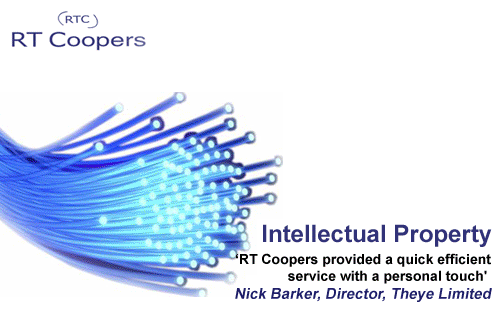RT Coopers
All businesses must ensure that they protect their intellectual property (IP). It is prudent that you not only set aside a budget for IP protection, however that you also periodically carry out regular due diligence.
Trade marks are a type of IP and businesses should register their names as trade marks. But, under the UK and EU systems, it is not common knowledge that you can also register the likes of signatures, smells and sounds to cover your goods and/or services. The key to trade mark protection is to seek protection in the market where you are selling goods and/or providing services. Of course, because of the internet, this is not always clear cut. Protection over a range of markets may therefore be necessary.
The question is, how does a business protect its goods and/or services where these are sold over the internet? As part of our philosophy we deliver commercial solutions to clients and there are various commercial strategies which can be implemented to ensure adequate protection. For example, although goods are available on the internet, you could restrict the goods to local residents if that’s the case. Therefore, it is crucial to have adequate website terms and conditions to reflect this.
One of the issues that businesses face on the internet is the fact that content and images could be copied wholesale and used by others. In fact, there are situations where people have copied entire websites and simply changed the business’ name – this amounts to copyright infringement. Other forms of copyright infringement include copying a website’s:
Look and feel;
Shape; and/or
Design.
An avenue of recourse open to a business is to bring legal action against those particular companies or individuals for copyright infringement. Before doing so, the business must ensure it owns the content and the rights to the website. Under UK and EU law, the owner of the content and/or the website is the author, such as the website developer or photographer in the case of images.
Other issues that are pertinent to the internet are:
- Pay per click advertising where companies’ names are used as keywords to direct traffic to their websites.
- Use of companies’ names in meta tags so as to drive traffic to their websites.
- Registering domain names which are similar or identical to registered trade marks with different top-level domains, e.g. “.org” or “.net”. This could be damaging to a business.
If you decide to bring proceedings for infringement over the internet, the first step would be to locate the wrongdoers. There are potential difficulties with this, for example, sometimes they operate offshore and you may not have an address for them or their internet service provider. The second step and a major influencing factor in deciding whether to bring proceedings is where you would bring the action. Although there are certain rules that usually dictate this, you should bear in mind that judgments may be difficult to enforce in certain countries.
So, what do you do? It is a tightrope that businesses have to walk to strike the right balance between maintaining brand reputation, ensuring their brand is not diluted, policing the internet for infringers and emitting the right no-nonsense signal to potential infringers. There are various ways to manage cost in doing this, which is where we can assist.
RT coopers is a specialist global law firm and we cater for a range of clients operating in all industry sectors. A large part of our work involves intellectual property law and internet law.
Websites:
www.rtcoopers.com
www.rtcoopersiplaw.com
Tel: 020 7488 9947

